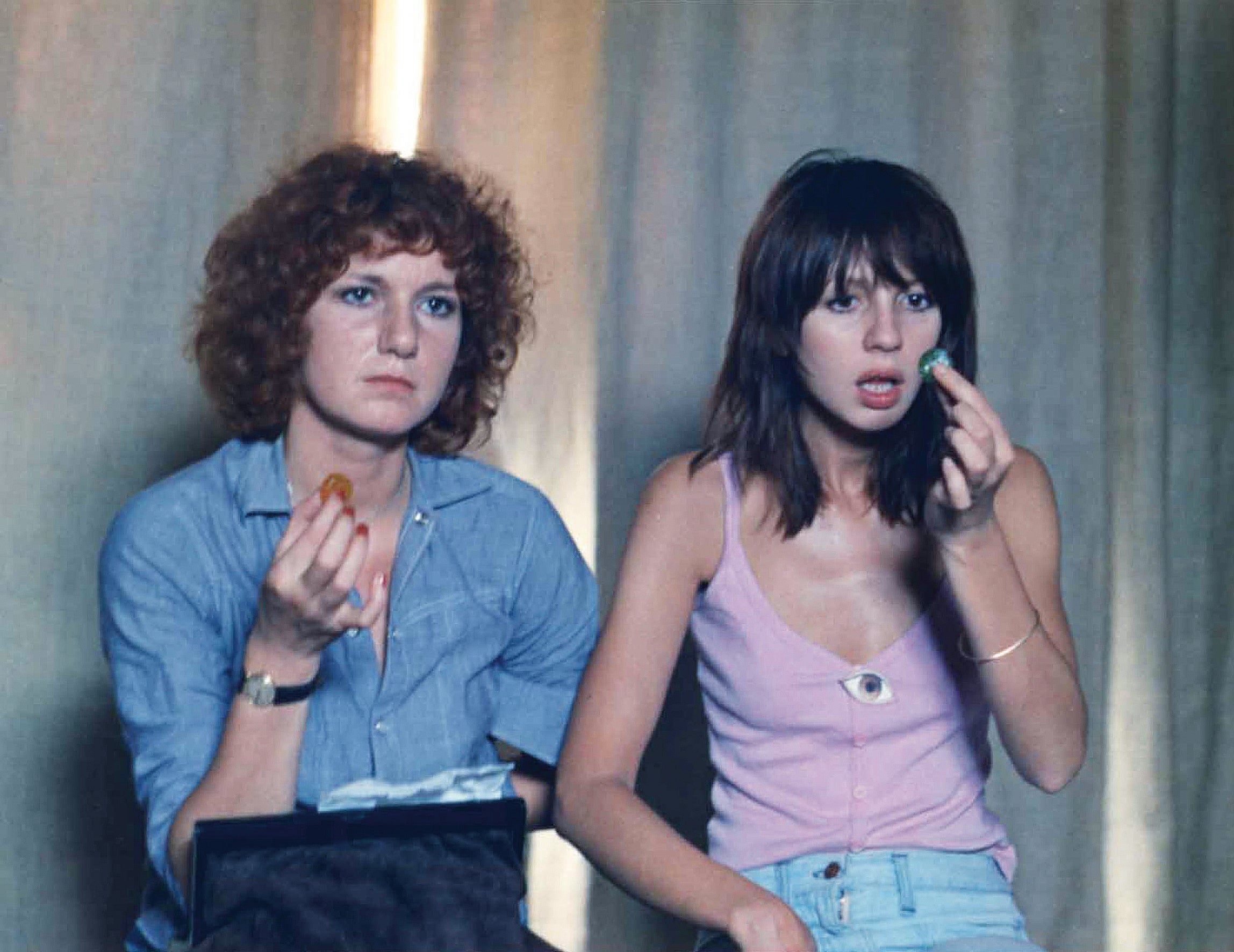To celebrate Film Feels Curious: Eye Rituals, Lydia Rostant tells us all about Jacques Rivette's masterpiece from 1974.
Usually it goes like this …
A woman sits on a park bench. The place is Paris, the year is 1976, and the woman is reading a big red book entitled MAGIC. She is Julie. Here comes another woman, tripping across the sand of the playground, dropping her belongings as she hurries – she is Celine, of course. Oblivious to Julie’s cou-cou’s and gestures, Celine darts away, leaving Julie no choice but to jump up and pursue her. End scene. Except it doesn't end there. In a game of cat and mouse (or cat and cat, as the case may be), the women dart across Paris, their heels ringing out along empty cobble streets, their sunglasses slipping down as they trip up stairs. Sometimes they stop to smoke a cigarette; playful, provoking each other. At one point they even come face to face, panting and exhilarated by the silent game they play, of which the audience understands neither the rules nor the end goal.
Julie is a liberarian. Her hours are spent governing the hundreds of rational, linear books that fill her space. She tells a man to smoke covertly please, she files and she scribes. Celine is a magician. She stomps into Julie’s library, slams book covers, fiddles and draws the outlines of her hands in red marker on the books. In the first of many doublings, Julie is moved by some whim to press her red ink-stained fingertips onto her ledger, smiling as she does so. The women provoke in each other a wildness, a refusal to be governed that is childlike and intoxicating. We learn to watch for these doublings, these moments of synergy between the two women throughout the film, and feel somehow implicated in them. Our delight at having cracked the women’s covert code, their embryonic bond, is rewarded by their grins and hoots of laughter. It is then a pleasure that goes three ways.

Perhaps the very function of magic (of which Celine is a professional practitioner) is to reveal the inner child; to feed a secretive, obscene part of us that delights at the trivial. The women intoxicate each other with their magic, loosening the binds of adulthood, of ‘proper behavior’ and responsibility, and upending the natural order of age and convention. By extension, the viewer is invited to forget all they may know about the traditional practice of watching films, and instead ride on the coattails of these women, renouncing a linear narrative, character development and wider context along the way.
Celine and Julie see symbols everywhere they go. In their world, everyday things – mirrors, sweets, dolls – are portals to the surreal, the sublime, the erotic. Coloured candies allow them to enter a film within a film; a strange house, where an ensemble of distant, wax-work like characters move from room to room in a tightly scripted chamber piece. At first Celine and Julie are bound to this script, reciting lines dutifully. Soon however, they grow impatient and gain agency over their actions, perverting the storyline and teasing the wooden characters and their strange neurotic world. It is an obvious metaphor for the film itself, in which our central characters consistently trouble and upend the logic and mode of the narrative; impersonating each other, disguising themselves, repeating actions, mimicking the mode and artifice of filmmaking itself. The result is a cinematic house of mirrors, in which any number of different arrangements apparently lead back to the same goal – the freedom and pleasure of Celine and Julie.
Aside from their professions, we learn very little about Celine and Julie. We are not privy to their fears, their hurts, their jealousies or foibles. Instead, their freewheeling friendship is the central tenet around which all else is built, and nothing beyond this matters. Their relationship arrives one day out of the blue, and the path that led up to it neither matters, or provides amusement for either. Throughout the film, the women play each other’s mother, sister, cousin, lover, daughter, paramour – adopting these parts with ease, as though they were two sides of one bright penny.
Recent films have explored the complex and contradictory nature of womanhood – and rightfully so. But what Rivette presents so deftly here, is two female characters who forbid us to peer beneath their surface. Though their actions are impulsive, their desire to be impenetrable to scrutiny, and perhaps to criticism, is greater. They are like the playthings they surround themselves with – shiny, inventive, bizarre and susceptible to the uncanny. They despise pretension, ridiculing those around them that lavish in it. Julie says ‘it doesn’t hurt to fall off the moon’. What, if anything, does it mean? It hardly matters because by this point we have learnt the rules of film, and understand this to be merely a slice of poetic ephemera, intriguing and beautiful and true in emotion, if not in logic.
But the next morning …
Ultimately then, in Jacques Rivette’s masterpiece, the pursuit of fun and pleasure is a radical act. Radical in both the way it upends the conventions of film, and perhaps more pertinently, in the way it explores the unmitigated joy and mischief of female friendship in a way very few films since have achieved. Though it belongs staunchly to the conventions of the French New Wave – in its love of frivolity, its serious commitment to the unserious, it’s almost elastic sense of disorder – it also occupies a second irreverent category – what should we call it? Glamorous clownery? Psychosexual impishness? Subversive hilarity? Perhaps we should just call it magic…


